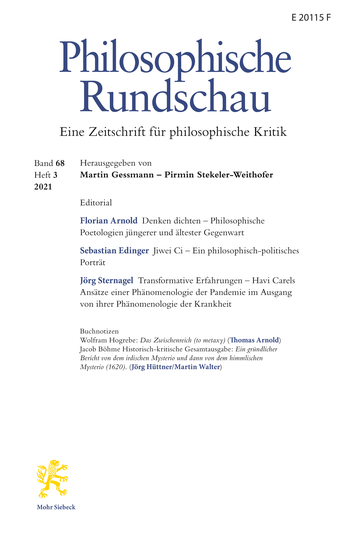The poetry boom of the last two decades is not only in the German-speaking world accompanied by a new self-understanding of poetic thought. Poetry is increasingly experienced as basic research in the border areas of our linguistic construction of reality, and thus it seems to inherit the tradition of philosophical speculation. The review looks at a selection of recent publications at the interface of poetry and thought, and at the same time goes back to the beginnings of this connection: What today seems to constitute the core of contemporary enthusiasm for creativity as poetic thinking dates back to debates around 1800 in Weimar and Jena, which have lost none of their relevance in the last 200 years. On the contrary, it is only in the confrontation with this oldest present of a philosophical-poetic modernity that one can gauge what poetic thinking weighs today.
Eberhard Rathgeb: Zwei Hälften des Lebens. Hegel & Hölderlin. Eine Freundschaft. München 2019: Blessing. 464 S.
Hans-Peter Kunisch: Todtnauberg. Die Geschichte von Paul Celan, Martin Heidegger und ihrer unmöglichen Begegnung. München: dtv 2020. 350 S.
Werner Hamacher: Studien zu Hölderlin. Herausgegeben von Shinu Sara Ottenburger und Peter Trawny. Rote Reihe 124. Frankfurt a. M. 2020: Vittorio Klostermann. 186 S.
Werner Hamacher: Keinmaleins. Texte zu Celan. Rote Reihe 108. Frankfurt a. M. 2019: Vittorio Klostermann. 256 S.
Thomas Kling: Werke in vier Bänden. Hrsg. v. Marcel Beyer in Zusammenarbeit mit Frieder von Ammon, Peer Trilcke und Gabriele Wix. Berlin 2020: Suhrkamp. 2692 S.
Amir Eshel: Dichterisch denken. Ein Essay. Aus dem Englischen von Ursula Kömen. Berlin 2020: Jüdischer Verlag im Suhrkamp Verlag. 280 S.
Christian Metz: Poetisch denken. Die Lyrik der Gegenwart. Frankfurt a. M. 2018: Fischer Verlag. 425 S.
